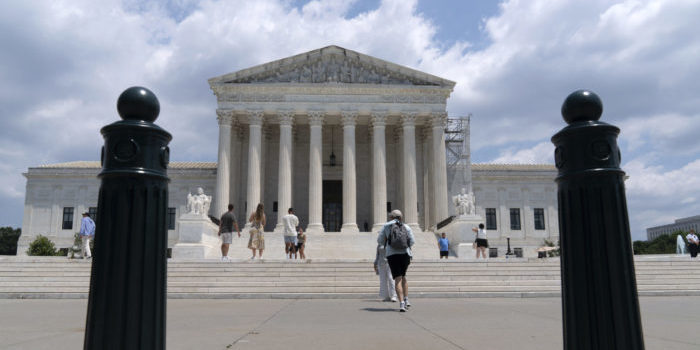(Andrew Rice, The Center Square) June marks the final month of the Supreme Court’s 2024-2025 term and all nine justices are racing against the clock to issue final opinions on controversial cases.
From the legality of a federal injunction against birthright citizenship, to gun manufacturer liabilities and even age verification for online pornography the court is busy with many decisions. Here are some of the cases that the nation’s highest court will decide before the end of the month.
Birthright Citizenship Injunction
On Jan. 20, the Trump administration issued an executive order revoking citizenship from children born in the United States to either mothers or fathers that are in the country illegally or temporarily.
Lawsuits were quickly filed in district courts across the country. Courts in Maryland, Massachusetts and Washington blocked the enforcement of the executive order, which prevented the measure from going into effect nationwide.
The Trump administration appealed the case citing concerns over a district court’s ability to instate a nationwide block on an executive order but the appeals court left the injunction intact.
Now, the Trump administration is asking the Supreme Court to decide whether a district judge can block an order from going into effect throughout the nation or simply in their own district.
Gun Manufacturer Liability
Smith and Wesson Brands, Inc. v. Estados Unidos Mexicanos
The Mexican government sued several United States gun manufacturers, arguing they facilitated gun trafficking to Mexican drug cartels.
Gun manufacturers, like Smith and Wesson, argued Mexico’s lawsuit is not allowed under the Protection of Lawful Commerce in Arms Act which blocks certain lawsuits against gun manufacturers.
The Supreme Court will decide whether United States gun manufacturers can be held liable for violence from Mexican drug cartels using illegally trafficked weapons.
Age Verification for Online Pornography
Free Speech Coalition, Inc. v. Paxton
This case is challenging a Texas law that requires online platforms that publish more than one-third sexually explicit content to implement age verification methods. The bill specifically sought to protect minors from access to sexually explicit content online.
The Free Speech Coalition challenged the law, arguing age verification violated the first amendment and conflicts with the communications decency act. Throughout the legal process, courts have gone back and forth whether to apply strict scrutiny or rational basis review to the case.
The Supreme Court will decide whether the case should be decided by strict scrutiny – a narrowly tailored law to achieve a compelling government interest – or rational basis – a law that is reasonably related to a government interest.
Transgender Medical Treatment for Minors
Tennessee and Kentucky passed laws restricting medical treatments for minors including administering puberty blockers, sex-transition surgeries and hormone therapy in 2023.
Groups of minors, their parents and healthcare providers challenged these laws, arguing they violated due process and equal protection rights.
The laws remain in effect for both Kentucky and Tennessee while the Supreme Court prepares to decide whether the equal protections clause of the 14th amendment applies to this case.
Parental Opt-In for Books on Gender and Sexuality
Parents sued Maryland’s Montgomery County School Board after it eliminated policies requiring parents receive notice and options for their children to opt into curriculum circulating around gender identity and sexuality.
The parents, from various religious backgrounds, cite a denial of religious freedom and parental rights in the case as the books conflicted with their faith on topics of gender, marriage and sexuality.
The Supreme Court is set to decide whether it is a violation of religious freedom and parents rights to be denied the opportunity to receive notice and opt-in to curriculum on gender and sexuality topics.

